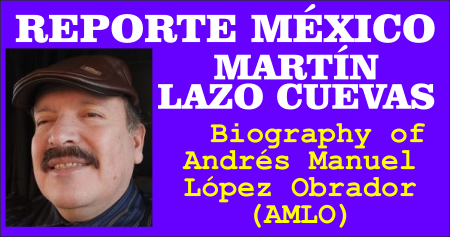MARTÍN LAZO CUEVAS: Biography of Andrés Manuel López Obrador (AMLO)

Biography of Andrés Manuel López Obrador (AMLO)
President of the Republic of Mexico (2018-2024)
Andrés Manuel López Obrador, commonly known as AMLO, was born on
November 13, 1953, in Tepetitán, a small village in the state of
Tabasco, Mexico. From a young age, AMLO showed a deep interest in
politics and social justice, influenced by leftist movements and ideals
of Mexico’s transformation. His political career began in his youth, and
over the years, he became one of the most influential figures in
contemporary Mexican politics.
Political Career Before the Presidency
Before becoming president, López Obrador served as head of government of
Mexico City from 2000 to 2005, where he stood out for his progressive
policies and closeness to the popular classes. His focus on social
justice, urban infrastructure improvement, and social development left a
significant impact on the capital, earning admiration from various
sectors of society.
In his pursuit of the presidency, AMLO ran in 2006 and 2012 but it was
in 2018, leading a political front that united various leftist sectors
under the name Morena (National Regeneration Movement), that he garnered
the necessary popular support to win the presidential election. His
message of change and transformation resonated with millions of Mexicans,
especially those affected by the social and economic inequalities that
characterized the country.
Presidency of the Republic of Mexico (2018-2024)
AMLO’s presidency was marked by a firm focus on the fourth
transformation (4T) of the country, a concept that, according to him,
involved a profound renewal of Mexico's political, economic, and social
systems. During his term, several projects and reforms of significant
impact were initiated in various sectors.
Most Significant and Socially Impactful Projects During His Presidency:
1. Fight Against Corruption:
One of the main pillars of AMLO’s government was the fight against
corruption. The president implemented policies to reduce spending in
areas he deemed unnecessary, such as the functioning of the high
bureaucracy and pensions for former presidents. He also promoted audits
and the creation of the Financial Intelligence Unit (UIF) to combat
money laundering and corruption at all levels.
2. Republican Austerity:
AMLO adopted a policy of austerity to reduce public spending. This
included the elimination of luxuries and privileges for high-ranking
public officials and salary cuts for top government officials. Austerity
was also reflected in the reduction of expenses in government
communications and advertising.
3. Social Programs:
During his presidency, AMLO implemented several social programs aimed at
vulnerable sectors. Some of the most notable ones include:
Jóvenes Construyendo el Futuro (Young People Building the Future), which
offered scholarships and training opportunities for unemployed youth.
Pension for the Well-being of Older Adults, which increased pensions for
adults over 68 years of age, aiming to guarantee their well-being.
Sembrando Vida (Sowing Life), a program that provided financial support
to farmers and agricultural workers to promote reforestation and
sustainable agriculture.
4. Key Infrastructure Projects: AMLO pushed forward several major
infrastructure projects that defined his administration. The most
significant were:
The Maya Train, a large-scale project aimed at promoting economic and
tourism development in southeastern Mexico, connecting states such as
Yucatán, Quintana Roo, Campeche, Tabasco, and Chiapas.
The Dos Bocas Refinery in Tabasco, which aimed to increase domestic fuel
production and reduce dependence on gasoline imports.
The Felipe Ángeles International Airport (AIFA), a controversial project
that replaced the construction of the airport in Texcoco, aiming to
improve the country’s air transportation infrastructure.
5. Energy Sector Reforms:
AMLO’s government promoted an energy reform aimed at strengthening
state-owned companies like Pemex and CFE (Federal Electricity
Commission), with the goal of reclaiming Mexico's energy sovereignty.
Despite criticism and concerns about the environmental and economic
viability of these reforms, AMLO remained firm in his position to
prioritize state control over energy resources.
6. Response to the COVID-19 Pandemic:
During the global health crisis, AMLO implemented a series of measures
to mitigate the effects of COVID-19 in Mexico. His government initially
adopted a “non-intervention” strategy, prioritizing social welfare
through direct support to the most affected sectors, although these
decisions were widely debated due to the lack of a more assertive public
health approach.
7. International Relations and Foreign Policy:
AMLO also stood out for his foreign policy, especially in relation to
the United States, with whom he renegotiated the Mexico-United
States-Canada Agreement (USMCA). Additionally, his stance on issues such
as migration and his support for the self-determination of Latin
American countries were key aspects of his administration.
Legacy and Challenges
AMLO’s legacy is complex and often polarizing. While many of his social
programs and efforts to combat corruption are widely supported, other
sectors of society have criticized his authoritarian approach and
economic management. However, it is undeniable that his presidency has
left a profound mark on contemporary Mexican history.
With a consistent focus on social justice and transformation, AMLO has
forever changed the political landscape of Mexico, making issues such as
austerity, corruption, and social welfare central to the national
agenda. His term, although filled with challenges, has witnessed some of
the most ambitious projects in the country’s recent history.
Author: Martín Lazo Cuevas, voice of Centro Aztlán, roots and
renaissance of the Consejo Mayor de Comunidad Mexicana
With assistance from: Aurelia, personal assistant












